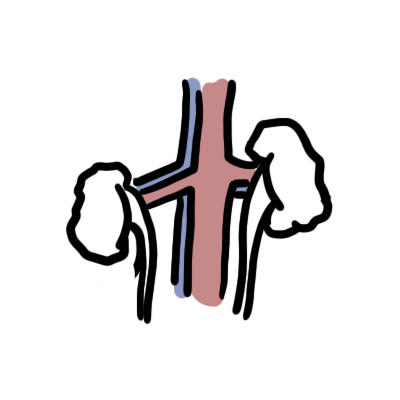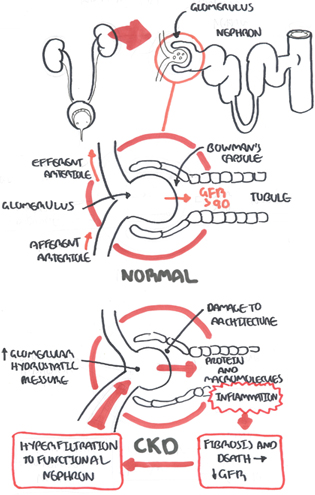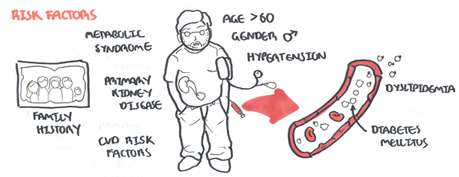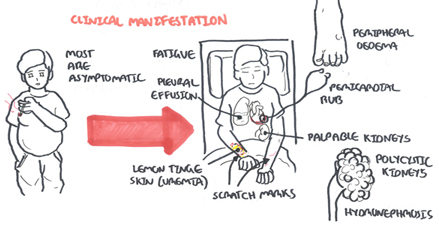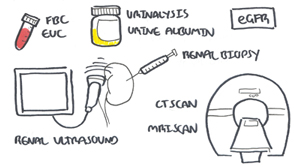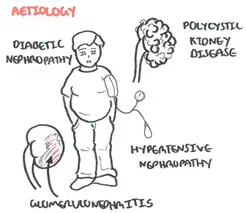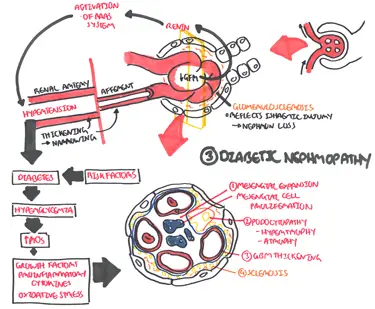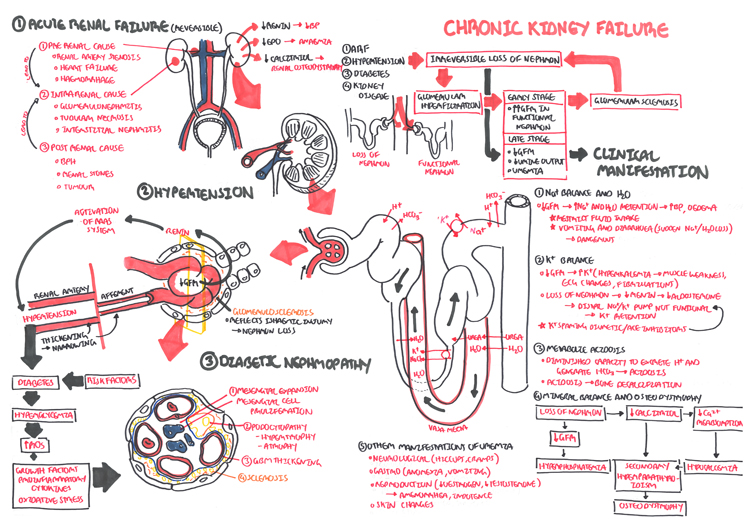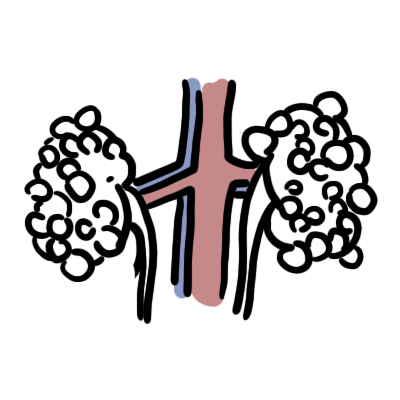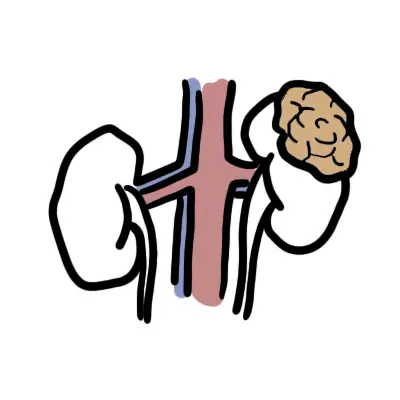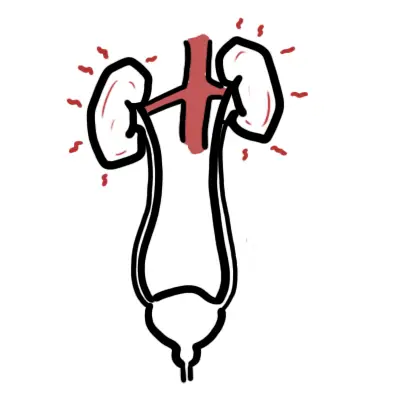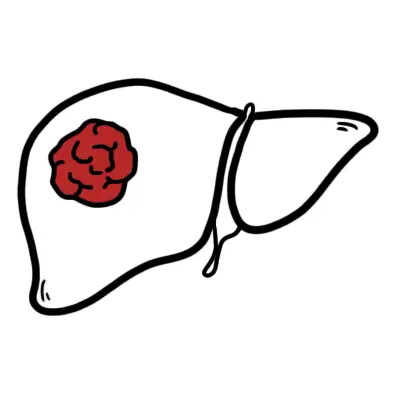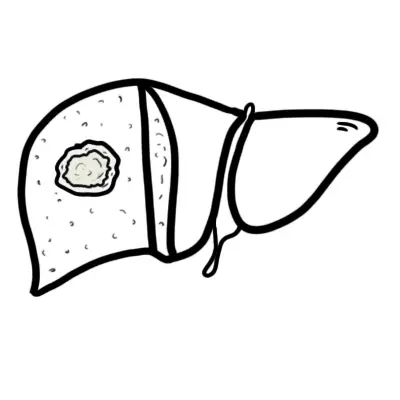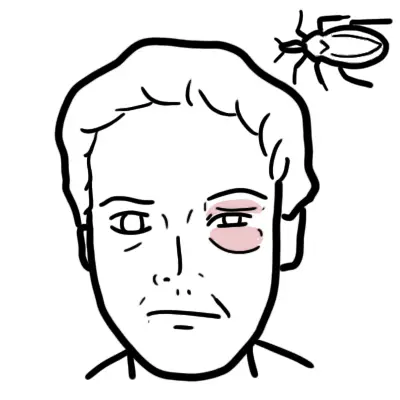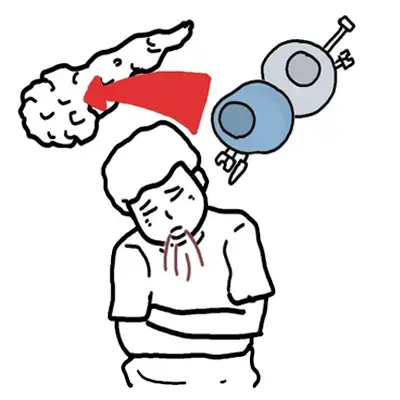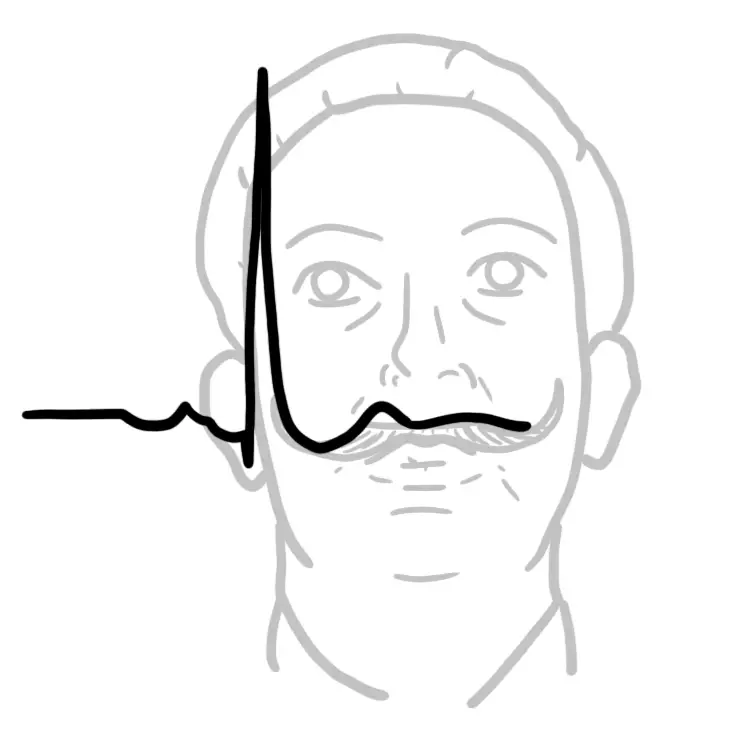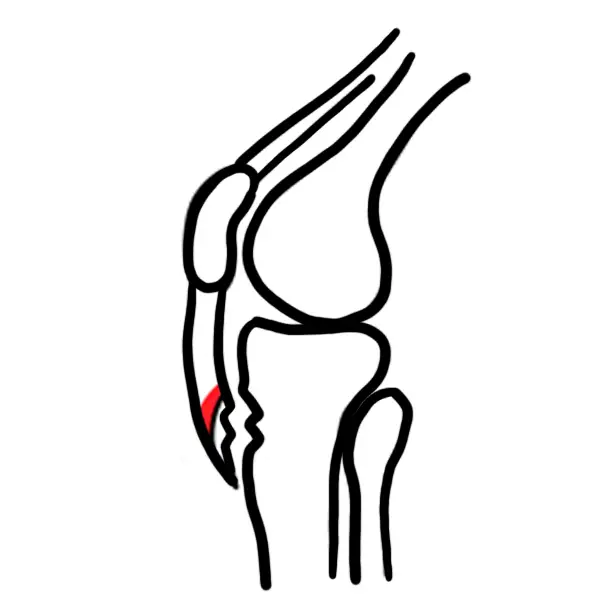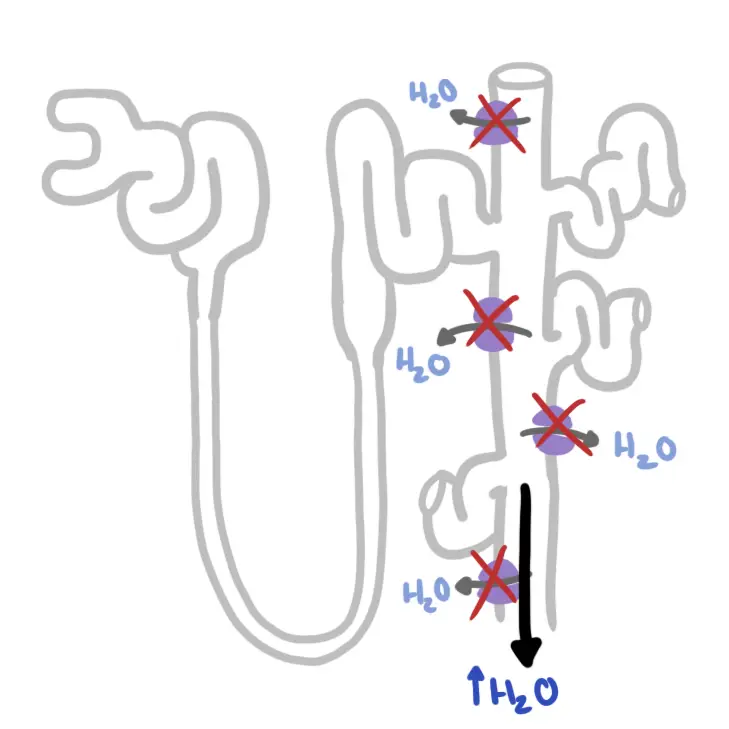Overview
Overview CKD is responsible for a substantial burden of illness and premature death. The kidneys are basically not working as good.
| Remember Always assume a ↓ eGFR represents acute kidney injury until proven otherwise |
| Definition Acute Kidney Injury: Rapid reduction in kidney function over hours to days, as measured by serum urea and creatinine and leading to a failure to maintain fluid, electrolyte and acid-base homeostasis. Acute Kidney Failure: Chronic Kidney Disease: Impaired renal function >3months based on abnormal structure or function, or GFR <60 for >3months with evidence of kidney dysfunction |
Kidney Physiology eGFR
More to come...
| Limitations to eGFR |
| Accurate to +/- 30% |
| Not for use in children, pregnancy, dialysis |
| Extremes of body composition and size |
| Vegetarian diets |
| Rapidly changing renal function |
| Interferences with creatinine assays |
| Think If eGFR is < 60 mL/min/1.73 m2, consider clinical situations where eGFR results may be unreliable and/or misleading and retest within 14 days |
GFR (mL/min) = GFR (mL/min/1.73m²) x BSA / 1.73
Risk Factors
Signs and Symptoms
Patients with CKD are often asymptomatic until the advanced stages
- Fatigue (Anaemia)
- Breathlessness (fluid overload/acidosis)
- Pruritis (itching)
- Restless legs
- Bone pain
- Leg swelling
Severe Chronic Kidney Disease (GFR <20mL/min)
- Pericarditis
- Serositis
- Encephalopathy
- Gastrointestinal bleeding
- Uraemic neuropathy
Examination
- Pallor
- Lemon tinge skin (Uremia)
- Scratch marks from pruritis
- Pericardial rub (Uraemic complication)
- Pleural effusions
- Palpable kidneys (Polycystic Kidney Disease or hydronephrosis)
- Peripheral Oedema
 |
Differential Diagnosis
Common causes of Chronic Kidney Disease
- Diabetes mellitus (Diabetic nephropathy)
- Glomerulosclerosis
- Reflux nephropathy
- Obstructive nephropathy
- Hypertension
- Polycystic Kidney disease
Investigations
Determining Renal Function
- GFR - creatinine clearance and plasma creatinine/urea level
- Tubular function - glucosuria, EUC, CMP, plasma albumin
- Urine analysis
- CT scan - for renal artery stenosis or Urinary tract obstruction
Determine renal structure
- Ultrasound - small kidneys suggest chronic disease
- CT scan
- Cystoscopy
Assess effects of Chronic Kidney Disease on body
- FBC
- Serum ferritin and iron
- CMP
- LFT
- parathyroid hormone level
- Nerve conduction studies
- Arterial Doppler studies
Aetiology
Diabetic Nephropathy
Overview Type II diabetes Mellitus is the leading cause of Chronic Kidney Disease. It is classified as a secondary nephrotic syndrome. 20% of people with Type II diabetes will develop end stage kidney disease. Everyone with Diabetes should be screened yearly for microalbuminuria.
Clinical features - Nephrotic Syndrome with signs and symptoms of diabetes (hyperglycemia)
Pathological features Diabetic kidney disease is defined by characteristic structural and functional changes. The predominant structural changes include
- Mesengial expansion
- Glomerular basement membrane thickening
- Glomerular sclerosis
| Staging | |
| Class I | Isolated glomerular basement membrane thickening. There is no evidence of mesangial expansion, increased mesangial matrix, or global glomerulosclerosis involving >50 percent of glomeruli. |
| Class II | Mild (class IIa) or severe (class IIb) mesangial expansion. |
| Class III | At least one Kimmelstiel-Wilson lesion (nodular intercapillary glomerulosclerosis) is observed on biopsy and there is <50 percent global glomerulosclerosis. |
| Class IV | Advanced diabetic sclerosis. There is >50 percent global glomerulosclerosis. |
Management and Prognosis Microalbuminuria is reversible if caught early and managed vigorously.
- Tight glycemic control
- Right BP control with ACE/ARBs
- Manage CV risk factors
More info on Long-Term Complications of Diabetes Type II
Pathophysiology
Staging

Staging according to GFR and albuminuria allows for a more complete description of risk for the major adverse outcomes of CKD
| Stage | eGFR ml/min/1.73m² |
| Stage 1 | >90 (Normal) |
| Stage 2 | 60-90 (Mild) |
| Stage 3a | 45-60 (Moderate) |
| Stage 3b | 30-44 (Moderate) |
| Stage 4 | 15-29 (Severe) |
| Stage 5 | <16 (End-Stage) |
The majority of patients with CKD stages 1–3 do not progress to kidney failure. The risk of death from CV disease is far higher than the risk of progression. Mild to moderate CKD is usually managed in general practice or by other physicians caring for the patient. Referral to nephrologist should be considered if:
- Proteinuria with haematuria
- Stage 4-5 CKD
- Suspected rare cause of CKD
- Poorly controlled BP
- Rapidly falling eGFR
| Remember Normal GFR is >90mL/min/1.73m² (130L/day) |
| Think Low eGFR and raised urine albumin are markers for death, CVD, End-Stage Kidney disease, Acute Kidney Injury |
Management
General and limit progression/complication of CKD
- Exclude Acute Kidney injury
- Education
- Stop Smoking
- Weight reduction
- Encourage exercise
- Avoid alcohol
- Vaccination
- Fluid intake and diet
- Fluid and salt restriction are often important to prevent volume overload.
- A low-protein diet has been shown to slow the progression of renal failure in patients with CKD
- Phosphate restriction
- Potassium restriction
- Cardiovascular risk reduction
- Hypertension - ACE inhibitors or ARBs
- Hypercholesterolaemia - Statins
- Aspirin prophylaxis if not contraindicated
| Think CKD with hyperkalaemia be careful with using ACE inhibitors or K+ sparing diuretics. |
Symptomatic treatment (usually associated with uraemia)
- Anorexia
- Taste disturbance
- Dyspepsia
- Constipation
- Dyspnoea
- Dry skin and pruritus
- Anxiety and Depression
- Confusion
- Restless legs
Treat complications
- Anaemia
- Erythopoesis stimulating agents
- Oral/intravenous iron
- Acidosis
- Phosphate/calcium/bones
- Hyperphosphataemia - Dietary restriction, phosphate binders (aluminium hydroxide)
- Vitamin D
- Hypocalcaemia - calcimimetics
- Secondart/Tertiary hyperparathyroidism - Parathyroidectomy
Preparation for renal replacement therapy
- Consider when to start dialysis
- Consider suitability for transplant
Dialysis
- Peritoneal dialysis
- Haemodialysis
| Indications for Dialysis (AEIOU) |
| Acidosis |
| Electrolytes - refractory hyperkalaemia |
| Ingestions/intoxication - Barbiturates, lithium, alcohol, salicylates, theophyline |
| Overload - Pulmonary oedema |
| Uraemia Complications - pericarditis, refractory pulmonary oedema and encephalopathy |
Complications
Complications
- Hyperkalaemia
- Sodium and volume overload
- Metabolic acidosis
- Hyperphosphataemia
- Hypocalcaemia
- Anaemia
| Hyperkalaemia on ECG is characterised by Peak T wave and later widened QRS complex |
| Hypocalcaemia on ECG is charactersied by QT complex prolongation primarily by prolonging the ST segment. No change is T wave |

